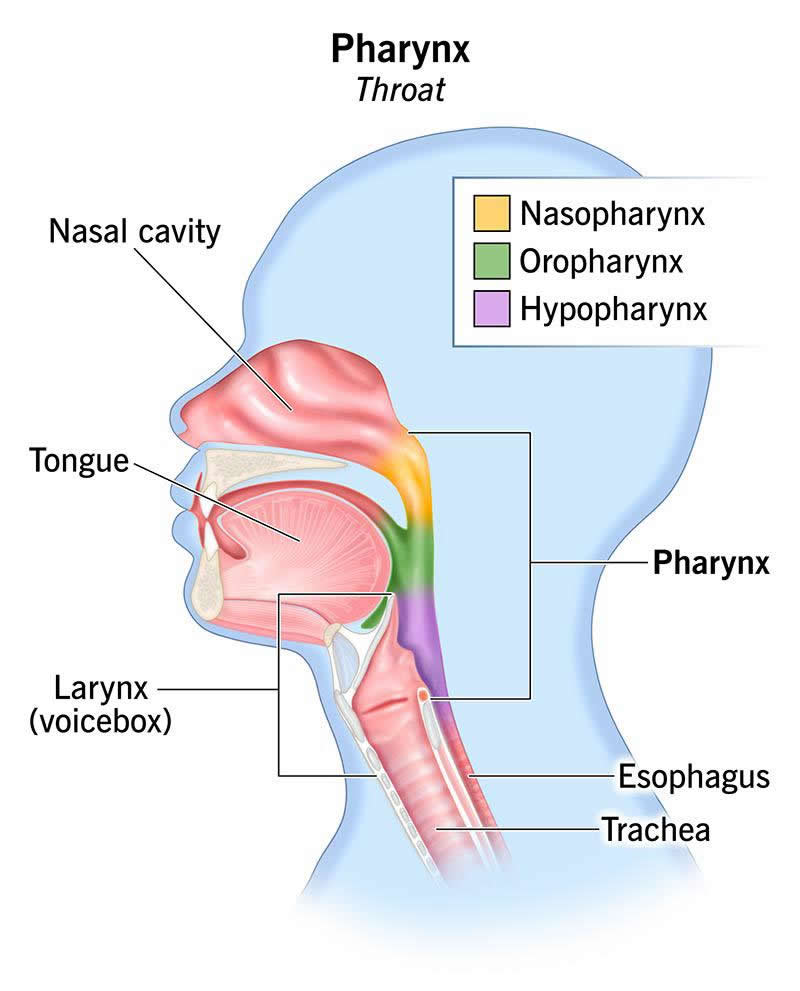Pharynx (Throat)
The pharynx (throat) is a muscular tube in the middle of your neck. It helps you to breathe and digest food. Many medical issues can affect your pharynx, from a common cold to cancer. You can protect your pharynx by not smoking and avoiding infection.
Overview

What is the pharynx?
Your pharynx (throat) is a multitasking muscular funnel that helps you breathe and directs food and liquid to your digestive system. You can keep your pharynx healthy by quitting smoking and protecting yourself from infections.
Function
What does the pharynx do?
In general, it supports your respiratory and digestive systems. Specifically, your pharynx:
- Routes air coming in your nose and mouth down to your larynx (voice box), which, in turn, moves air to your trachea and lungs.
- Delivers food and liquid to your esophagus, which sends them on to your stomach. More than that, your pharynx helps to make sure particles of food and liquid don’t tumble into your trachea and your lungs.
Anatomy
Where is the pharynx located?
Your pharynx is in the middle of your neck. It sits below the lower part of your skull and just above your esophagus and larynx.
What are the parts of your pharynx?
A pharynx has three parts:
- Nasopharynx, at the top of your throat. It connects your nose to your respiratory system.
- Oropharynx,in the middle of your throat. It contains your tonsils at the base of your tongue and connects to your oral cavity. Air, food and fluid all pass through your oropharynx.
- Hypopharynx, at the bottom of your pharynx. It regulates how food moves to your esophagus and on to your digestive system, and how air moves to your lungs.
What does the pharynx look like?
Your pharynx is a tube that’s about 4 inches long. It’s mostly muscle, with some cartilage that makes up the back of your pharynx.
Conditions and Disorders
What are common conditions and disorders that affect your pharynx?
Everything from the common cold to throat cancer may affect your pharynx. The most common conditions include:
- Sore throat (pharyngitis) caused by tonsillitis, infections, allergies or mouth breathing.
- Infections, including bacterial infections, like strep throat, and viral infections, like flu and mononucleosis.
- Cancer, including throat cancers like nasopharyngeal cancer, oropharyngeal cancer and hypopharyngeal cancer.
- Stroke, multiple sclerosis (MS) or other conditions that affect your central nervous system and make it hard for you to swallow (dysphagia).
Common symptoms of conditions that affect the pharynx
Many conditions may affect your pharynx, causing different symptoms. Some conditions are more serious than others. For example, having a sore throat doesn’t mean you have throat cancer. That said, you should talk to a healthcare provider if you have symptoms that don’t go away or keep coming back.
Common symptoms include:
- A sore throat that doesn’t go away after a few days.
- Troubling swallowing,
- Earache.
- Fever higher than 103 degrees Fahrenheit (39 degrees Celsius), which could be a sign of infection.
- Lumps in the back of your neck.
- Your neck feeling weak or stiff.
What are common tests to check on my pharynx?
Healthcare providers may do different kinds of tests, including:
- Biopsy.
- Laryngoscopy.
- Throat culture.
- Imaging tests like computed tomography (CT) scans or magnetic resonance imaging (MRI) scans.
Care
How can I take care of my throat?
Many things may affect your pharynx. You can reduce your risk of issues by:
- Quitting smoking: Using tobacco increases your throat cancer risk.
- Avoiding secondhand smoke: Breathing in secondhand smoke irritates your throat.
- Protecting yourself from infections: Washing your hands and avoiding people who are sick reduces your risk of illnesses that affect your throat, like strep throat, flu or colds.
- Drinking lots of water: Keeping your throat moist keeps it from becoming irritated and scratchy.
A note from Wockr
Your digestive and respiratory systems depend on a healthy pharynx (throat). Your pharynx helps get air to your lungs and food and fluid to your stomach. You can keep your pharynx healthy by not smoking and taking steps to protect yourself from infections.